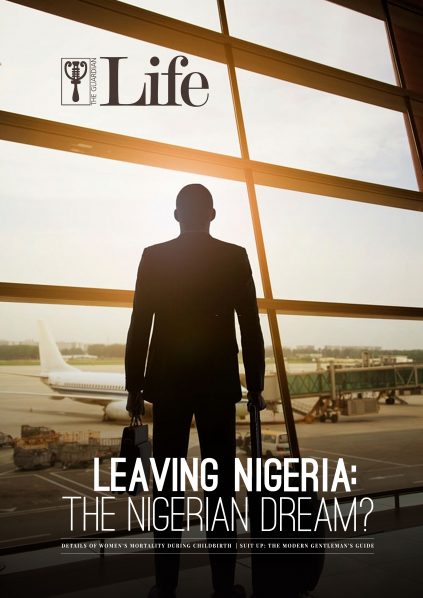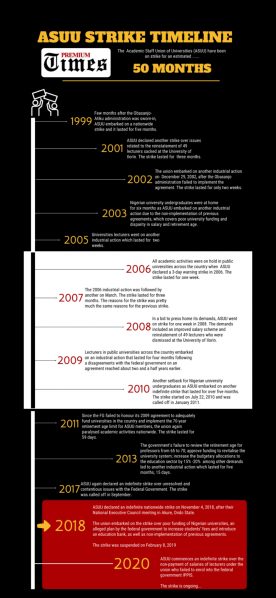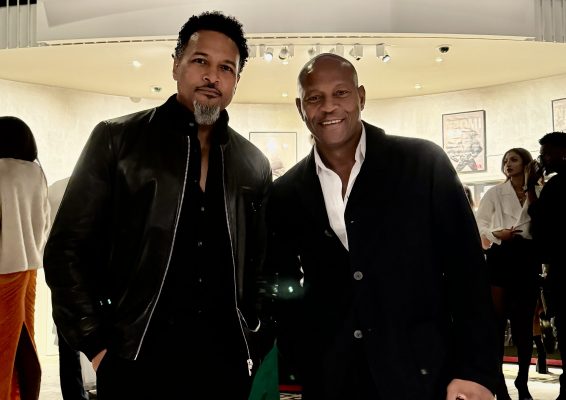
1974
When the federal Commissioner for Economic Development and Reconstruction, Prof. Adebayo Adedeji and his delegation embarked on a three‐week tour to US cities including New York, Washington, Chicago, Miami, Atlanta, and Los Angeles, his mission was simple: to convince Nigerians to return to their country to aid in economic development.
- O. Oche, the then information officer for the National Youth Service Corps, argued, “Their physical presence in Nigeria and their assistance to their people is most necessary at this stage of our development,…there are many job opportunities in Nigeria today.”
2018
Chris Ngige, Nigeria’s Minister of Labour, infamously said about the worrisome exodus of Nigerian doctors, “I am not worried about doctors leaving the country. We have surplus. If you have surplus, you export.”
[ad]
2019
PEW Research Center revealed that “almost half of Nigerian adults have indicated their willingness to leave the country in the next five years.
“According to findings from the survey, 45% of adults reveal that they plan to emigrate from the country in the period stated above. This is the highest share among the 12 countries surveyed across 4 Continents.”
The Rat Race
Paul (real name withheld) returned to Nigeria with a first class in Aeronautics engineering from a university in Russia. After staying in Nigeria for three years with no job, he decided to take on teaching, a role he did for 6 months before having his breakthrough. Only that this breakthrough was N70,000- not sufficient to cover his flight ticket back to Nigeria. Now among the over 12,000 Nigerians who relocated to Canada in 2019, his brother, a medical doctor, has plans to move once he is done with the mandatory National Youth Service Corps. He tells The Guardian Life that the “only reason I came back to do this [NYSC] is because my father insisted that I should come home. Do you think I would have returned after what happened to my brother?” In 2018, the government of Canada recorded that Nigeria falls only behind China with the number of persons who received invitations to apply (ITAs) for Canadian Express Entry in 2018.

On the other hand, Andrew (real name withheld) has big dreams, and part of this dream is to leave through any means, legal or not. With no education, he briefly tells the writer that he is “travelling outside”. His plan is entirely mapped out: to use illegal entry to leave the country for greener pastures even though it is a risky ride. In 2016 alone, over 20,000 Nigerians travelled across the Mediterranean Sea to seek for better opportunities outside of Africa.
Whatever the method, the intention is the same: to provide opportunities for themselves and their children.
Greener pastures?
Nigeria is a country with unavoidable highlights. As the seventh most populous country in the world, it is home to over 200 million people. 55.7% of this population are either unemployed or underemployed.
Yet, the nation has seen governments speak of plans to create an enabling environment. In an attempt to rise from the effect of the military regime, Olusegun Obasanjo, Nigeria’s first democratic president and former military head of state, plan’s to improve on the economy was via debt relief, strengthening of the banking sector and support of SME businesses via ‘backward integration programme.’ Since then, the governments have introduced out of poverty schemes for Nigerians, a lot of which have not affected its citizens. Today, Nigeria is the poverty capital of the world with 83 million of its citizens living in poverty.
A society characterised by the lack of job opportunities, and when there is, nepotism; lack of health and safety equipment; low wages; insecurity; lack of accountability from the government has constantly left the people in a place of dilemma. Although one must face the reality of adjusting to the new normal in an unfamiliar country, Samuel (real name withheld) is one of those staying illegally in a society that works. After trying to secure his papers in the US and failing, he argues that he rather be outside struggling with this than stay back in Nigeria. In 2018, Nigeria had the fourth largest group of asylum seekers in the European Union.
[ad]
When world class boxer, Anthony Joshua was scheduled to defend his title as undisputed champion of the world, a tweet showing support of the boxer was published by Abike Dabiri Erewa, Chairman of Nigerians in Diaspora Commission. Joshua is one of the many Nigerians who are celebrated for their heritage and not for the role that his home country has played in shaping his life.

Success has many friends, and it appears that as a nation, Nigeria is more inclined to recognise those who have global impact/show potentials of having a global impact. It is, therefore, no surprise that the likes of Onyema Ogbuagu, one of the researchers behind the COVID-19 vaccine breakthrough and Kene Ilochonwu, Alberta’s first black bencher, are celebrated. While it is worthy to note that like the aforementioned, both had their first degree in Nigeria, it is also imperative to point out that the course of seeking an environment where efforts to affect society, on the hinds of meritocracy also influences many’s decision to leave.
November 2020, for instance, will make it the 50th month out of 11 years that the ASUU (Academic Staff Union of Universities) has gone on strike due to the successive government’s inability to improve on the educational system and meet their demands for “Funding for Revitalization of public universities, payment of earned academic allowances, Visitation panels to universities and renegotiation of 2009 FGN/ASUU agreement.”
But even this reluctance is fuelled by the ability of the high-income families to afford education outside the country or the private university. Despite this reality, perhaps an even harsher reality is that 22.9% of second-degree holders (M.Sc/MS/MAdm) are unemployed, while this stands at 23.3% for Doctorate degree holders.
Now in its 7th year, The UN Refugee Agency reports that the north-east continues to face a refugee crisis with over two million citizens displaced, or missing because of the Boko Haram insurgency. Yet, Boko Haram repentants have been integrated back to society.
For decades, the Nigerian police have been accused of neglecting the masses in favour of those in power.
Entrepreneurs have their businesses stifled with the unfavourable business policies, bad road network and electricity. Farmers also have to grapple with the reality of the destruction of their crops by Cattle and inability to access loans.
Nigeria has one of the fastest-growing tech communities in the world. Yet, they were an easy target for the disbanded SARS unit of the police force. Besides this, there are some Nigerians unaccounted for and for vague crimes awaiting trials that may never come.

Kenechukwu Ugwu, a self-taught programmer, says that 2020 is his last year in Nigeria.
“I can’t be trying to make a living, be a target of SARS, and be trying to have an identity outside of the way we have been perceived as corrupt people. If Nigeria doesn’t make a way, I have to make a way for myself.”
The problems with Nigeria appear to have no end in sight.
Fixing The Future
Recommendations are only as good as its implementation. It is time that Nigeria takes seriously the impending damage that is about to befall it.
Awarding of projects and jobs based on meritocracy and not political allegiance will lead to an enabling environment for the citizenry. Ezra Olubi and Shola Akinlade whose company, Paystack, was recently acquired by global fintech giant, Stripe, for $200m+ (over 76 billion naira). This is just one of the many success stories that prove that when Nigeria’s vision is set on becoming a world powerhouse, with deliberate efforts, it can achieve it.
It is also important that issues bothering on national security and the protection of human lives are no longer paid lip service.
If there is anything the exodus has shown, it is that Nigeria has some of the brightest minds whose patriotism is influenced by the extent to which it is appreciated. As such, an environment where the policies are in favour of the masses and not the political class or strictly the high-class is needed.
We must consider that given the existing conditions if Nigeria were run as a business entity, it would have since folded.
Akinwale Akinyoade contributed to this cover
[ad unit=2]








